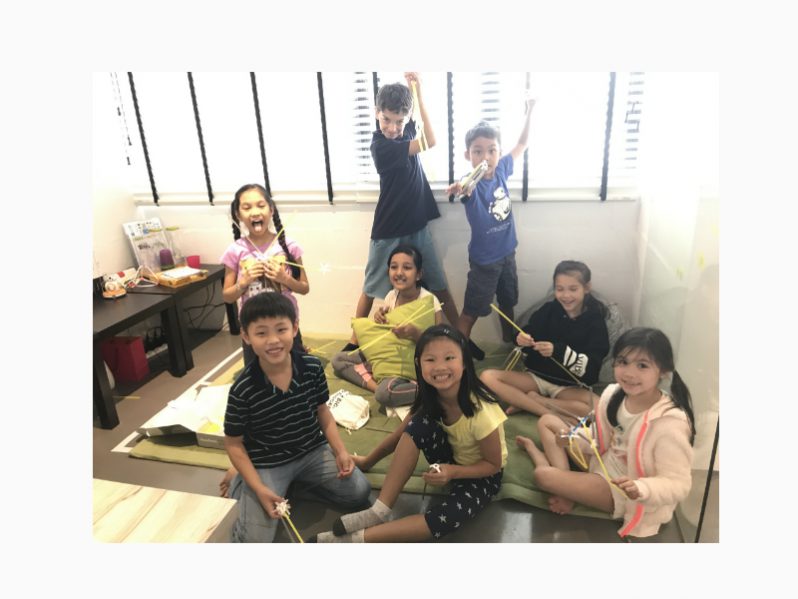
In this month’s issue of Beyond the Classroom, we are proud to present to you, Yong Ning – Founder of Coding Lab. Yong Ning wants to let students be exposed to computational tools at a younger age and together with his fantastic team, they design the curriculum to allow children to learn through “Understanding” rather than just “Memorising”.
1. Describe yourself and what you do?
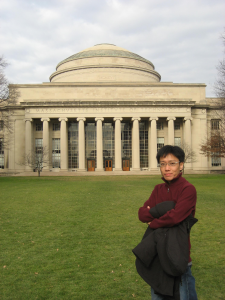
I graduated with a Masters in Computation for Design and Optimisation from the Massachusetts Institute of Technology (MIT) under a scholarship and spent a year working in a technology startup in Silicon Valley.
I enjoy Mathematics and Programming, and in my previous job, I was the Regional Director of a US MNC, responsible for ensuring optimal supply of products through business process optimization and application of data analytics to ensure sound business decisions.
2. Is there a story behind WHY you do what you do?/ To what extent have your talents/passions led you in any way to do what you do today?
I first started coding in University and loved it so much that I pursued a Masters in Computational Engineering at the Massachusetts Institute of Technology (MIT). As a father of two, I knew that technology was going to play a huge part in my kids’ lives. That got me thinking about introducing my favourite subject to them, in a fun way, to help them gain a better understanding of the games they play and the design behind their favourite toys.
At the same time, I ran into difficulties at work, coaching a few members of my team on how they could automate some of the analytical work they were doing. I realised that if the team had known the fundamental concepts of coding, they would have been far better off. One morning on my way to work, I saw the video “Let’s teach kids to code” by Mitchel Resnick of MIT Media Lab. That was the eye opener for me. That’s when the seed got planted in my mind to encourage children to learn to code, and I started working on Coding Lab. Today, we are present in 3 countries, Australia, Japan and Singapore, with the mission of empowering our young to become tomorrows’ creators of technology.
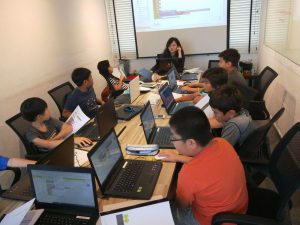
3. Share with us what you were like as a student and how school was like for you. In retrospect, how do you think that played a part in what you do now and who you have become?
I was not exactly what you would call a model student. I mean, I completed most of my homework assigned etc, but I was usually more interested in understanding the reason behind the work rather than finishing it. I also liked to challenge my teachers; if I had to clarify something or wanted to explore another angle, or simply disagreed with what was being taught. My teachers probably had a love-hate relationship with me (laughs!)
That’s also probably the reason I left my corporate job to start Coding Lab. Having used computational tools for a good part of my schooling and working life, I wanted to start a school that would help the younger student be exposed to it at a younger age. And the way I design the curriculum with my fantastic curriculum team is also in line with the idea of “understanding”, rather than “Memorising” – we are all aligned in setting an inquiry-based approach, where students are taught how to think of the answers by themselves, rather than simply copying or memorising the code.
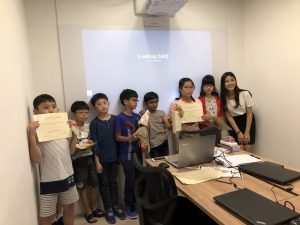
4. How do you reinvent yourself? What motivates you?
I like to go for walks, watch TED talks, and speak to people from all walks of life. These help me to keep in sync with the environment around me and synthesise new ideas. Watching my students grow in thinking and work hard to apply themselves to solve that programming problem, and the joy on their faces when they achieve it is something that motivates me. Having a positive impact on their lives.
5. What’s the best piece of advice you ever received or given? Or Share ONE life lesson and how it changed the way you approached life.
When I was at Silicon Valley, one of the mentors of the NUS Overseas College programme told us “Keep Asking. Keep Trying. These 4 words are relevant in every aspect of my life; be it wanting to try out something new and uncharted, connecting with others to ask questions I need to know the answers, working with my partners and collaborators to keep pushing the boundaries – the upside of trying and asking far outweighs the downside! In most cases, the worst you will get is a “No”. But the feeling of accomplishing something or learning something new is indescribable. Be brave!
6. The future-ready educator should…
Not just impart knowledge to students but to develop their ability to think critically, synthesize their learnings and apply their knowledge as widely as they can. With Google search giving us easy access to tons of data via the web, the ability to apply critical thinking to quickly sift out the key information required is important. We also need to impress upon students the transferability of skills between different domains (for example, the Mathematics/programming skills used for risk management in financial institutions can be applied to inventory management). Understanding the linkages, similarities and transferability of the different domains will allow rapid learning and also take their creativity to the next level as they apply their skills from one domain to another seemingly unrelated domain, providing them with an unfair advantage, be it at school or at work.
7. What have you just learnt recently that blew you away? /Share an example of a life that you impacted
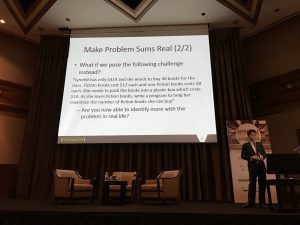
I recently worked with a team of student volunteers to teach Python to underprivileged teens at a charitable organisation. The experience was humbling in many ways – the enthusiasm of our student volunteers in sharing their knowledge, the graciousness and wonderful learning attitude that the students exhibited.
There are many families out there who may not be able to afford the classes. We, therefore, work closely with various charity organisations and train our student volunteers to provide free coaching to the underprivileged. Kudos to our team of student volunteers who are happy to give up their Saturday morning or afternoons to make sure no one is left behind. We are blessed to have them to work with us in creating a caring and gracious society.
8. How do you hope your business might do its part to transform or add value to the educational scene in Singapore?
Parents nowadays are well-read and know a good school when they see one. Which is why at Coding Lab, we spare no expense in providing a quality computer-science education that meets the expectations of even the most discerning parents.
We train every single educator to embrace the Coding Lab® style of teaching, to ensure that students truly understand the fundamentals and principles behind what they are learning, and not just simply regurgitate blindly.
As a parent myself, I want the environment to be comfortable for computer work (think: Full -length glass doors, swivel chairs, relaxing views out into the distance where kids get to relax their eyes in between) so much so that kids often jokingly refer to our school as a “Resort”. I guess that helps when they won’t even realise that they are tackling seriously advanced problems sometimes!
We hope to partner with parents in empowering every child with a solid understanding of computational thinking, regardless of their future career.
